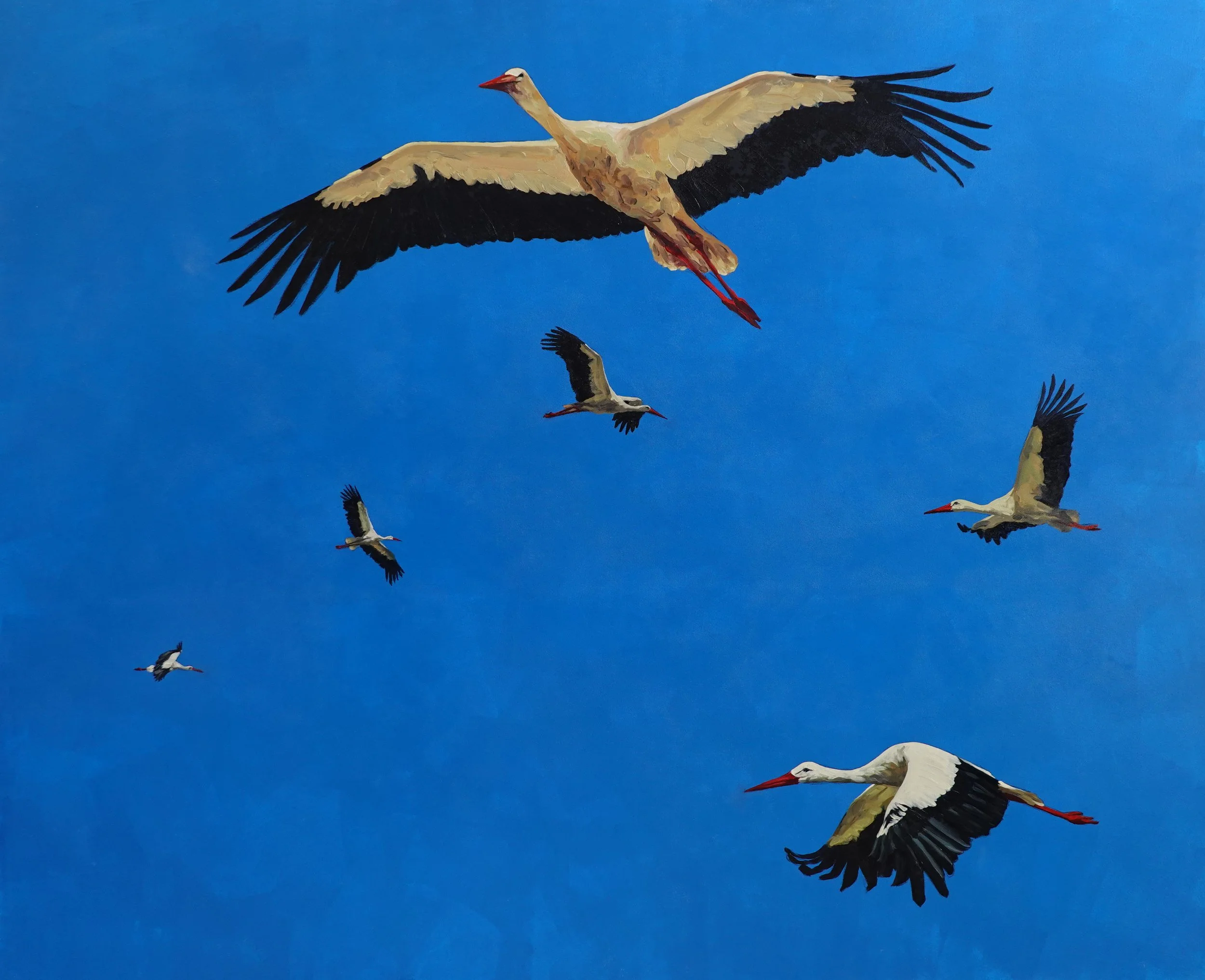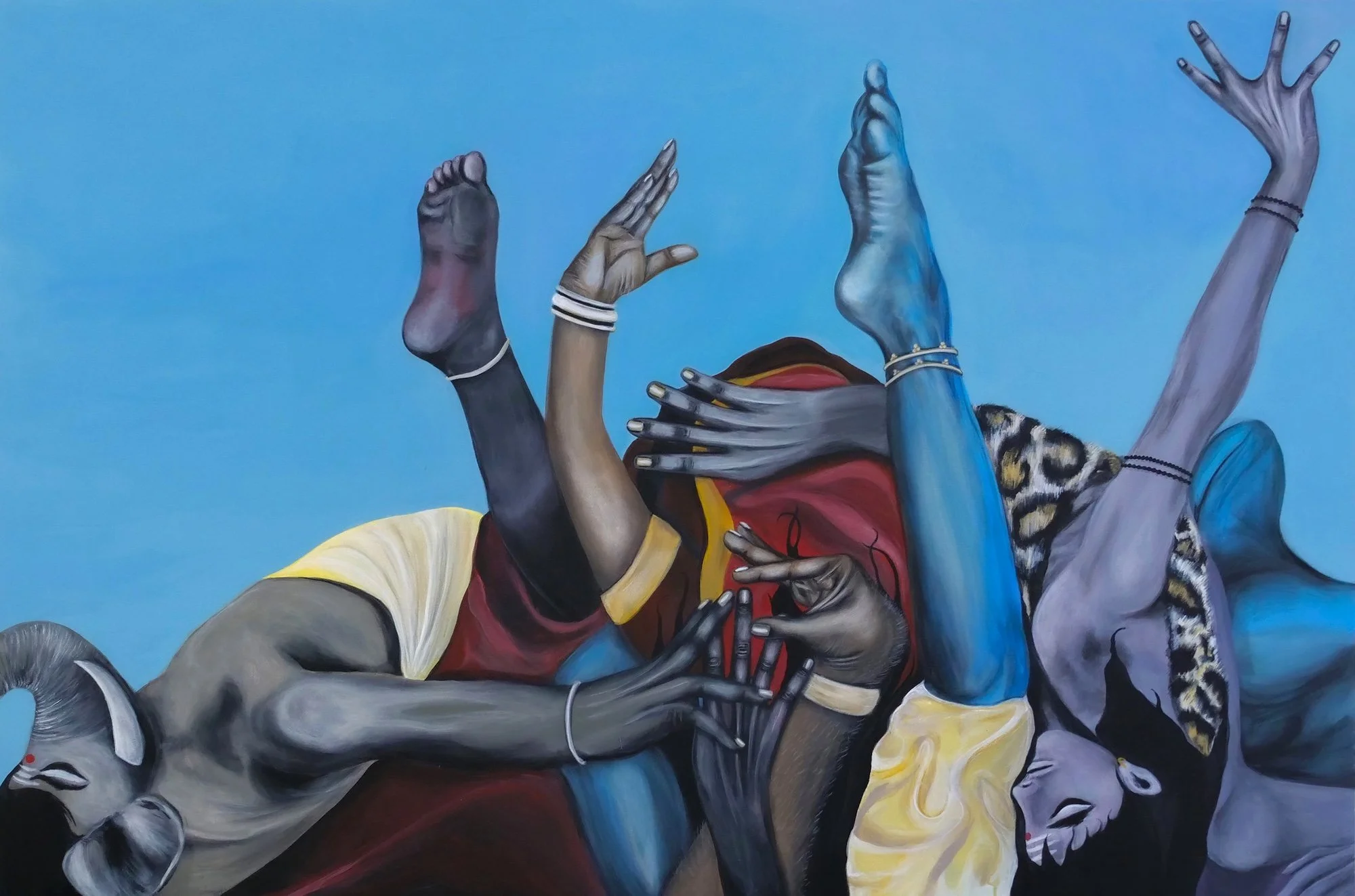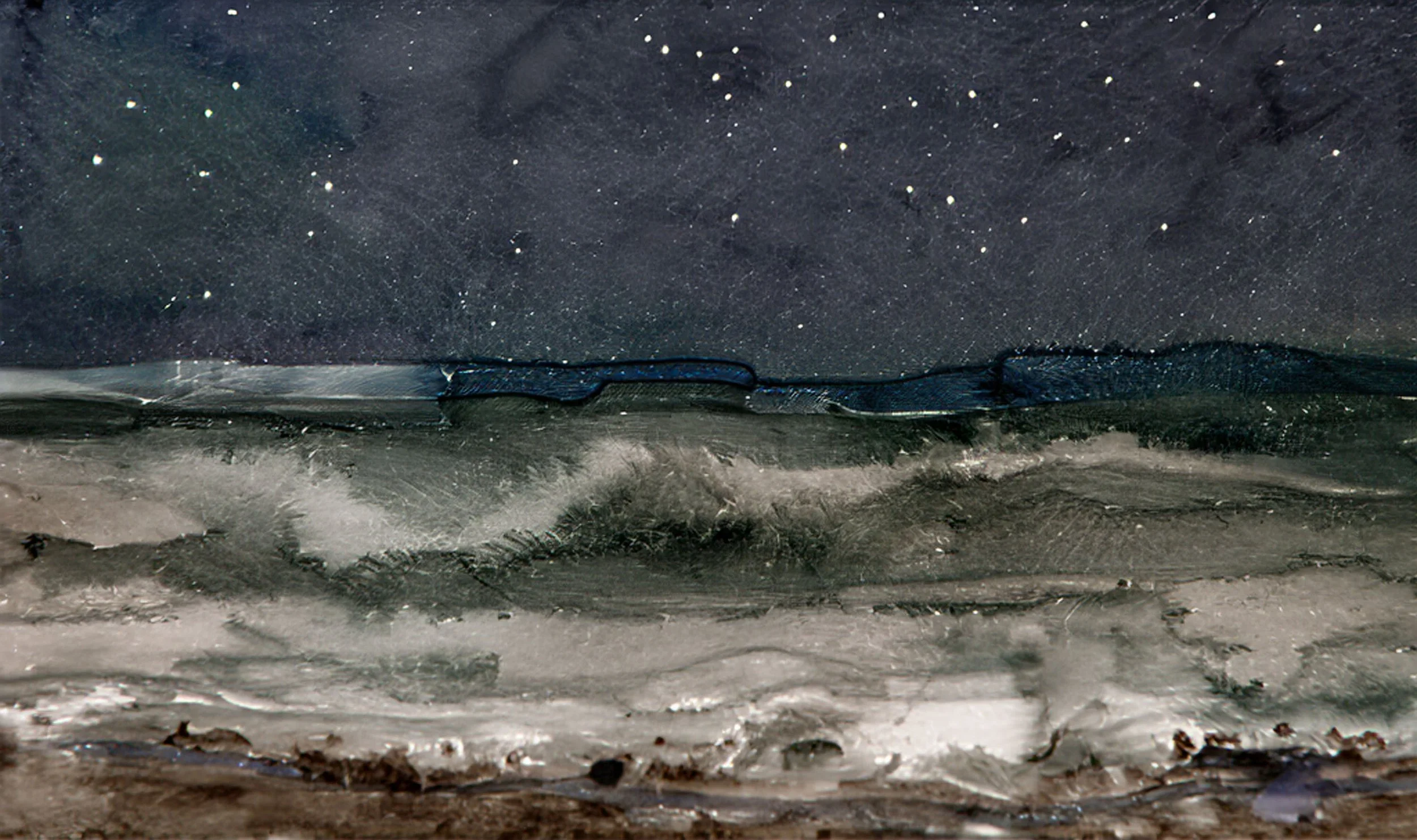10 Questions with Masha Eretnova
Masha Eretnova is a nomadic abstract artist working with acrylics, texture, and mixed media. She went from corporate to being an artist and chose abstract forms to be her messengers.
Masha thinks of her abstract paintings as unfinished thoughts, rarely naming the works to ensure she doesn’t plant ideas to prime viewers.
Her work is intended to be imbued with personal meaning and reflects on identity, character formation, and personality development. Masha believes any meaning and feelings attached to a particular painting can evolve and change over time. Through her paintings, she can look deeper into herself and encourage viewers to embark on this journey.
When Masha works on paper and canvas, she uses thick layers of color to create depth, texture, and volume. The paint, a heavy, honey-like consistency, flows on the canvas, making the painting process meditative and therapeutic. Finished shapes and forms take viewers on a subconscious, silent, meditative journey.
Masha Eretnova - Portrait
INTERVIEW
First of all, let's talk about your background. When and how did you start getting involved with art?
I was born and raised in a small village in Russia with less than 50 houses at that time. But my parents wanted a bigger future for me, so I was involved in all sorts of activities (piano, art, English classes) since I was about four years old. It meant long commute hours for my parents and me, but I loved my painting teacher and the NY advent calendars at my English school.
Art came naturally, although none of my parents painted or drew. My father's youth was surrounded by music, and he has carried on with this hobby till today. I guess he wanted me to have something that talks to your soul as well.
My father taught me how to draw and paint – first, I was painting portraits of our cats (they were posing voluntarily, I swear) and some dresses on models, although I always struggled with faces, and I was seriously creating some architectural plans for dream houses.
Later, I was learning painting as a hobby in art centers, but I could only fully discover it in 2018 with oils. It looks like I've been painting for all my life, or at least about 20 years!
The Power Of Love, Acrylic on canvas, 70x90 cm, 2021 © Masha Eretnova
And how did you develop into the artist you are today?
To be honest, I was too busy chasing a good education and corporate to develop into the artist I would like to be today. I had no time to ask myself what I love to do. I was trying to build a little marketing empire. Then COVID-19 happened.
Gladly, by a happy lucky chance, a friend of mine needed my help with her project, and the only condition was to fly to Bali, which I did without hesitation or much planning and zero research. Lockdown brought me back to the roots. I love doing something with my hands, so I got back to painting. But this time, I chose abstract. And I just started a daily art practice routine in my room. At that time, I hadn't yet realized art would be precisely what saved me. As we all know, lockdown was rough. I worked with marketing for many offline businesses. That part of the job and income was gone. I was also a really good ads expert, so that was going well until Facebook locked all my work accounts, including my personal Facebook profile.
At that point, I just gave up on it. I lost everything I was building for years. And I lost clients. I lost money. That was rock bottom. And following the advice of my partner, I got, yet again, back to what I love - art. And I started an art blog to support my creations financially.
But if I'm being honest, I think I already knew I would become an artist in 2012. I was studying in Montpellier, in France, and it was my very first time visiting Pierre Soulages' solo exhibition. I couldn't leave the place. I couldn't. It was it. He is absolutely my favorite painter, and I still have that feeling of awe for art that his works gave me.
Let's talk about your work. What inspired you to work with painting? And why did you choose this medium specifically?
I'm a very tactile and old-school person. I can only read a real book because I need to smell it. I was doing film photography for two years at Uni, but I needed something more tangible.
And with painting, you can feel so many textures - paper, canvas, paints, water, brushes, palette knives. I think it is very meditative, natural, and very powerful. I love rediscovering creativity through simple things - dishwashing sponge becomes a tool for creating textures, as well as bubble wrap and one of my favorites - sand.
And it is also something that connects people. We can paint together, and we can go to an art supplies store to eye shop, chat, and get ideas. We store the paintings, and every once in a while, we go back to the storage room, and all the memories come to life. We go to art galleries and museums, and we chat - across the world. Painting is very symbolic to me.
Speaking of mediums, I still think I haven't decided. I love acrylics, oils, texture, and mixed media. I'm an official art supplies hoarder, and I just love all of the mediums, how they differ, how they work, and how they tell the story.
Ephemeral, Fluid acrylics on paper, 21x14.5 cm 2022 © Masha Eretnova
Identity, Acrylic on paper, 14x21 cm, 2022 © Masha Eretnova
How do you choose the subjects to paint? And where do you find inspiration for your work?
I don't think my process starts with choosing a subject. Maybe it is wrong, but as I'm a self-taught painter, I was never told what the rules of the game are, and I just do what I know best - paint.
To be honest, I think inspiration is everywhere and nowhere, especially for artists. It can be a conversation, mood, thoughts, nature, a photograph on my phone, a recent trip. And the next day, everything will be dull, and you will stare at the blank canvas. This work was untitled for three years until I visited Japan. Now, this work acquired one - Samurai. For sure, the more you look at art, the more ideas will flood your mind, and it can be both good and bad.
What is your creative process like? Do you have any specific rules or routines?
I do not have a specific rule; however, I tend to work mainly with black color. I am not looking into giving my style a name or setting up a strict process; I guess the key for me is to want to make art and have some ideas of shapes, colors, and thoughts I may try to represent.
Often, it is the medium that sets everything on and inspires me to think of a work around it. For example, I stumbled upon some turmeric powder, and I absolutely needed to make DIY paint with it.
We can say it is a part of my routine that I don't use an easel. I'm not sure why, but I feel limited (maybe I just didn't have a very good one), and I prefer to paint on the canvas lying on the floor, table, or against the wall.
For figurative paintings, it would probably be unacceptable as it can distort the perspective and composition, but I find it the best way for my art - it gives me the distance between me and the work I need to observe while creating it.
The creative process is meditation and sometimes aftermath. For example, I did this painting called Woman after a long guided meditation on femininity. I think it took me less than an hour, and I didn't think a bit of what I was working on - I knew. It is on paper, but on the back of the paper, I intentionally tore it lightly and scraped Stay Strong. But it is not always that spiritual. In fact, I do not consider myself a spiritual being. Nor do I consider myself creative. I just don't think about it.
Samurai, Acrylic on paper, 21x29 cm, 2020 © Masha Eretnova
You work primarily with abstract paintings. How would you define your style? And how has it evolved over the years?
I initially started working with a minimalist approach - I only worked with black color and very simple compositions, often featuring one focal point.
Today, I've progressed to using other colors and mixed media. I would like to believe I'm still looking for the style to define, still on the hunt, and still driven. I think that defines me as an artist at the moment - the thirst for it.
In 2023, I found myself, as a person and an artist, rethinking the matters of identity and belonging. As I said, I was born and raised in Russia, and even though I'm not living there for years, I felt like the war and the aftermath made me question a lot, and for me, the only way I can rework those feelings and thoughts is art. I think those questions will be the topics of the upcoming series.
What is for you the most enjoyable part of your work? And what do you find more difficult to tackle?
I'm blessed to be this little girl who opens a Christmas present every time I get a new set of paints or start a new painting. It is something unknown but long waited for. The best feeling ever. It makes you happy, and you realize that you're living your dream.
The most difficult task for me is to sell to be there and show up, no matter what, and so far, I'm not good at it. I'm an introvert, and every time I apply for an open call or do a post on social media, I feel icky.
So many rude people will tell you - you're color blind, this is not art, your art is crappy, etc - all true stories. And making sure it doesn't affect my passion for art, my day, and my mental state is the real challenge.
Woman, Acrylic on paper, 30x42 cm, 2020 © Masha Eretnova
Personality Foundation, Acrylic on paper, 25.5x35.5 cm, 2020 © Masha Eretnova
What do you hope that the public takes away from your work? Or what messages would you like to communicate with your paintings?
As a part of my creative philosophy, I'm trying to make sure I'm not "priming" viewers with my ideas and visions. I've spent around five years studying psychology, and I know that even a little cue can send us in a very specific direction. I would like every single person to have an intimate experience, personal meaning, and freedom to interpret a message that doesn't have to be spoken of. I hope the public is open to exploring, looking beyond, and searching for the meaning versus being told what it is you're looking at.
I would also like to challenge the idea that every artwork should have a meaning. Greatest minds were opposed to this idea, and I think it is true that sometimes we should be able to just make art without feeling the pressure of infusing it with deep context and meaning.
What are you working on now, and what are your plans for the future in terms of new projects?
I'm currently moving across the world to set up a base in South America, most likely Argentina. My plan for this year is to prepare a large series of abstract works that will be the foundation of a project I have in mind.
One day, I'd like to make an interactive art exhibition accompanied by a statistical study to research how people interpret Untitled abstract art. It is a long process and requires lots of planning, but it should be fun! I start the preparation with lots of notes, thinking, and researching. So I'm at this stage now.
Finally, do you have any upcoming shows or collaborations you are looking forward to?
In January, I was selected for a long list of female artists for Arts to Hearts Magazine, and I'm currently waiting for the results of the people's choice votes and the jury decision. I'm also excited to see the upcoming online show "Emptiness" featuring one of my works. As of January 2024, I joined a very cool art start-up - Art Propeller. I think it is an amazing and fun way to learn about more artists. When you land on the site and click the button, you will be randomly introduced to one artist. They already have around 300 creators there! I'm glad some enthusiasts are finding a way to merge technology and art.
Artist’s Talk
Al-Tiba9 Interviews is a promotional platform for artists to articulate their vision and engage them with our diverse readership through a published art dialogue. The artists are interviewed by Mohamed Benhadj, the founder & curator of Al-Tiba9, to highlight their artistic careers and introduce them to the international contemporary art scene across our vast network of museums, galleries, art professionals, art dealers, collectors, and art lovers across the globe.





















